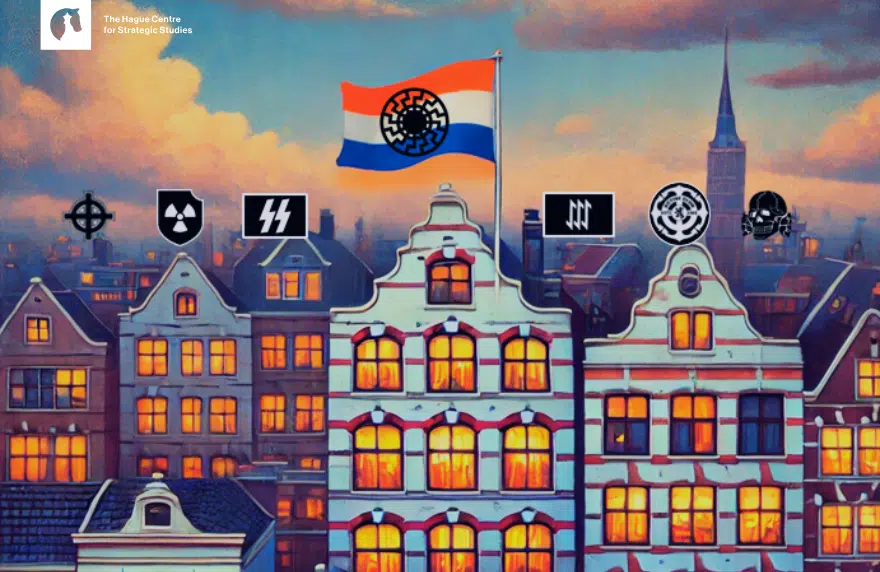Digitale rechtsextremistische subculturen vormen een reële en groeiende dreiging, ook in ons land. Wat is ‘Siege’ en waarom vormt deze extreemrechtse online subcultuur een toenemend geweldsrisico in Nederland?
In een nieuwe HCSS Snapshot, “De bloei van Siege Culture: Een casus van online extremistische dreiging“, onderzoeken Philippe van Pappelendam en Gerben Bakker de opkomst en maatschappelijke impact van de gewelddadige, extreemrechtse online subcultuur ‘Siege’. De beweging ontleent haar naam en ideologische fundament aan het boek Siege van de Amerikaanse neonazi James Mason. Daarin wordt de democratische rechtsstaat voorgesteld als fundamenteel corrupt, en wordt geweld niet slechts gelegitimeerd, maar als noodzakelijk en moreel wenselijk gepresenteerd.
Hoewel de subcultuur relatief klein is, vormt zij een gevaarlijke onderstroom binnen het mondiale extreemrechtse landschap. De aanhangers—vaak jonge, sociaal geïsoleerde mannen—organiseren zich online in gedecentraliseerde netwerken, waar memes, podcasts en manifesten worden gebruikt om haat te verspreiden, aanslagplegers te verheerlijken, en geweld te normaliseren. De aantrekkingskracht zit niet in een politiek alternatief, maar in de belofte van vernietiging.
De Siege-subcultuur is wereldwijd gelinkt aan concrete geweldsincidenten, en ook in Nederland worden signalen van groeiende invloed zichtbaar. Zo zijn er online netwerken actief waarin geweldsverheerlijking, antisemitisme en rassenhaat worden gedeeld. De beweging pleit voor de ineenstorting van de samenleving om plaats te maken voor een nieuwe etnonationalistische orde. Aanslagen van ‘lone wolves’ worden systematisch bestudeerd, verheerlijkt en nagedaan. Binnen Siege-kringen worden aanslagplegers als Breivik en Tarrant aangeduid als ‘Heiligen’, en hun manifesten circuleren als instructiemateriaal.
Wat deze dreiging urgent maakt, is dat Siege-ideeën zich vermengen met bredere rechtsextremistische trends. Via influencers, memes en gamingplatforms worden extreem gewelddadige denkbeelden genormaliseerd en laagdrempelig verspreid. Er ontstaat een cultuur waarin geweld als identiteit en expressie wordt verheerlijkt.
Deze HCSS Snapshot biedt niet alleen een diepgaande analyse van de ideologie en het netwerk, maar bespreekt ook vier strategieën om deze dreiging tegen te gaan:
- Vroegtijdige signalering van jongeren met een fascinatie voor geweld;
- Digitale disruptie van netwerken via technologische en strategische interventies;
- Gebruik van tegen-narratieven en technologie om extremistische beeldcultuur te ondermijnen;
- Herijking van juridische kaders om beter te kunnen optreden tegen online extremisme.
Siege is geen marginaal fenomeen meer, maar een groeiend digitaal ecosysteem waarin geweld, nihilisme en rassenhaat samensmelten tot een lifestyle. Jongeren worden verleid door visuele esthetiek, een overzichtelijk haatnarratief en de illusie van controle via destructie. De wereld wordt voorgesteld als fundamenteel verrot, waarbij geweld niet alleen toegestaan is — maar moreel geboden.





